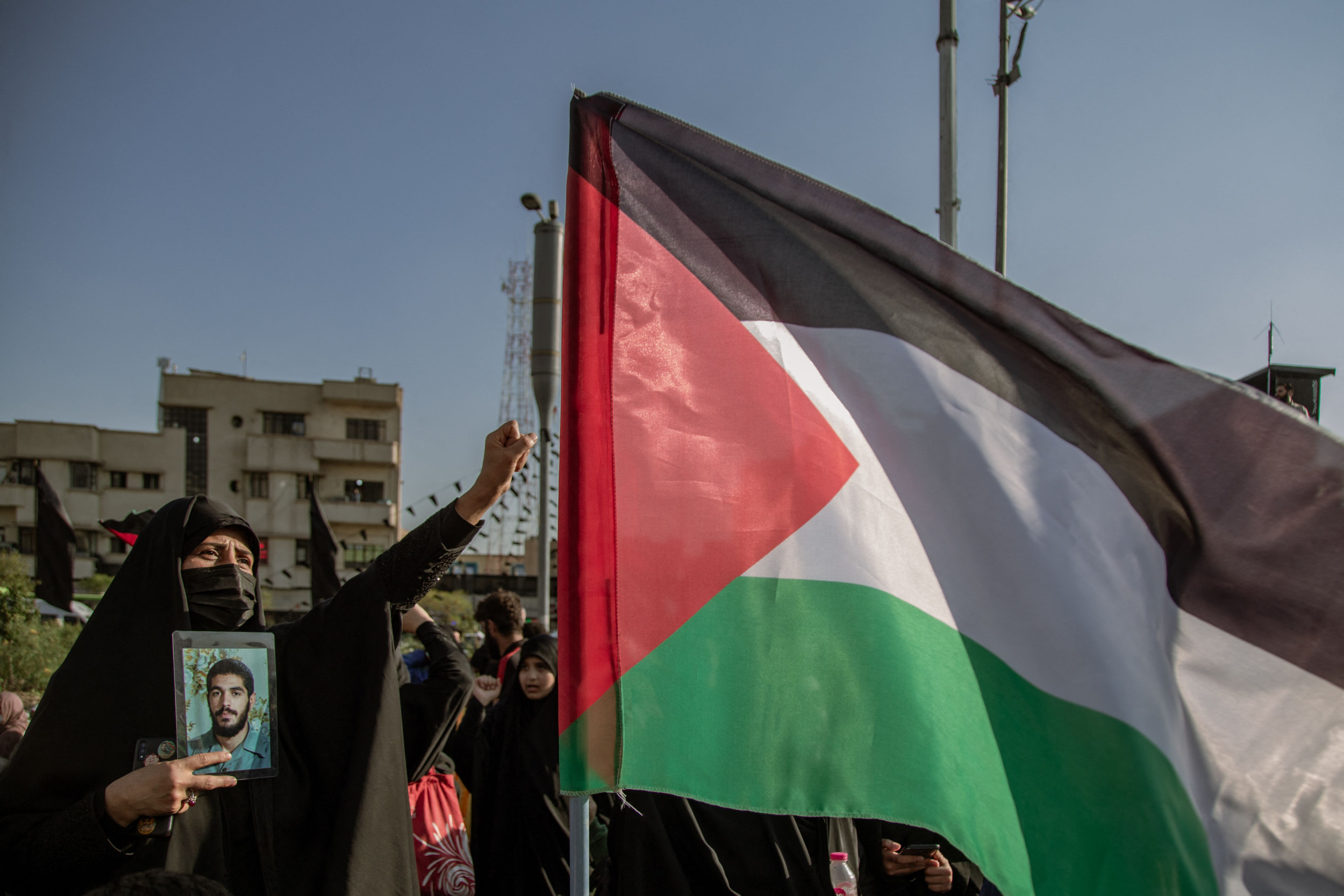
With the expiration of UN sanctions designed to thwart Iran's development of ballistic missiles, both Tehran and ally Russia have said there is nothing standing in the way of them trading such technology.
The claims have led to concerns that Moscow and Tehran could try to expand their existing arms dealing to include more advanced weaponry, know-how, and technology that could boost both Russia's war effort in Ukraine and Iran's ballistic-missile and drone programs.
But while observers do not discount the possibility that Iran could try to sell previously barred weapons -- chiefly, powerful short-range ballistic missiles -- to Russia, they express skepticism Tehran will follow through.
Among the reasons, they say, are Tehran's need to maintain its own military stockpiles amid increased conflict in the Middle East, the desire to be seen as a compliant and legitimate arms trader by the international community, and the continuation of an already existing strategy of supporting the manufacture of such weaponry in other countries, including Russia.
Hamidreza Azizi, a fellow at the German Institute for International and Security Affairs in Berlin, told RFE/RL that Iran's suggestion that it is no longer subject to UN sanctions limiting its missile program is more "political, rather than technical" as it seeks to "normalize" its ability to conduct military trades and transfers.
"The actual impact of the expiry of the UN Security Council restrictions on Iran's missile program, in terms of its impact on Iran's ability to develop its missile program, is rather limited," Azizi said.
"Because all these years we witnessed that, despite those restrictions being in place, Iran managed to develop not only its missile program, but also its drone program, its military capabilities, to an unprecedented level.
"Iran set up a manufacturing facility for reconnaissance and combat drones in Tajikistan and Belarus is reportedly seeking to establish a factory to produce the Iranian Shahed-136 kamikaze drone believed to be used extensively by Russia in its war against Ukraine.
Western officials have also revealed the existence of a drone facility being built in Russia with Iran's assistance that would allow Moscow to build domestic versions of Iranian drones in huge numbers and could be in operation by early 2024.
With the expiration of the UN sanctions, which were largely regarded as toothless, Azizi says he expects Iran to stick to its policy "of considering its military capabilities as nonnegotiable" in any international negotiations while "continuing to advance its capabilities.
"Iran can already boast some of the most sophisticated missiles and drones in the Middle East at a time when Tehran's support of proxies and militant groups in the region is being watched closely as archenemy Israel battles the Iranian-backed Hamas extremist organization.
Since Russia's invasion of Ukraine in February 2022, Iran has widely been accused of delivering cheap but effective kamikaze drones to Moscow.
While Iran denies the allegations, saying it only sold drones to Moscow before the war started, U.
S.
officials have repeatedly accused Tehran of supplying Shahed-136 Iranian drones that Russia has used to destroy civilian infrastructure in Ukraine.
There has been evidence of Iranian drones rebranded as Russian Geran-2s being used on the battlefield.
And as the two countries have increased military-technical cooperation, Iran's Defense Ministry has routinely showcased its ballistic, cruise, anti-tank, and air-defense missile systems to Russian officials.
The sanctions, in effect since 2015 and enshrined in UN Resolution 2231, expired on October 18 as part of the moribund Iran nuclear deal with world powers known as the Joint Comprehensive Plan of Action (JCPOA).
The United States withdrew from the deal, which offered sanctions relief in exchange for curbs on Iran's nuclear program, in 2018.
As European signatories Britain, France, and Germany tried to keep the pact alive, Iran abandoned some of its commitments, but never withdrew from the JCPOA.
The UN sanctions, which were introduced when the Security Council approved the JCPOA, called on Iran, among other things, "not to undertake any activity related to ballistic missiles designed to be capable of delivering nuclear weapons.
" Under the terms, any countries wishing to engage in related trade with Iran were required to first get approval from the UN Security Council.
In separate statements as the sanctions expired, Iran and Russia were quick to claim that they would no longer be bound by the restrictions, although neither side announced any concrete plans for future cooperation regarding Iran's ballistic-missile program.
Iran's Defense Ministry, for its part, said Tehran regarded the development as an opportunity to "strengthen its defense capabilities.
" But Azizi said Iran now "sees itself free from restrictions to export military technology and weapons, rather than to import them.
"Russia, Azizi said, is also interested in underscoring that "there are no more restrictions or special commitments that Iran needs to observe in its military-technical cooperation when it comes to missiles" so that it can also "potentially increase the potential for Iran to send missiles to Russia.
"Iran's previous export of Shahed-136 drones to Russia could be explained in part because they "arguably" fell under the UN's classification of conventional weapons, according to Jeremy Binnie, Middle East defense specialist at the global intelligence company Janes.
A kamikaze drone alleged to be an Iranian-made Shahed is seen in the sky over Kyiv during a strike.
"We have not seen any evidence of transfers of Iranian missiles to Russia so far, but it is unclear if this has been because the Iranians did not want to be seen to be so obviously violating UNSCR 2231," Binnie told RFE/RL in written comments.
Now that the UN sanctions have expired, he said, Iran "may now be more willing to overtly provide arms" to Russia, Binnie said.
As for Russia seeking Iranian missiles, Azizi said, "as Ukraine's Western allies increase the level of their military support for Ukraine, there might be a moment that the Russian leaders decide [to import Iranian missiles because] it's not going to make any difference.
"Whether Iran would actually part with such weaponry is another question, particularly considering the current war between Israel and Hamas in the Gaza Strip and the prospect of direct Iranian involvement in that conflict.
"Another consideration for the Iranians is maintaining their own military capabilities, which would be undermined by transferring significant numbers of missiles to Russia," Binnie said.
"The uncertain situation in the Middle East right now is likely to increase Iranian unwillingness to supply weapons to Russia that they feel should be retained at home or supplied to allied groups in support of its regional goals.
"One solution, Binnie said, "might be to replicate what has happened with the Shahed-136s, whereby Iran supplies initial batches, then transfers the technology to Russia so it can build them locally.
"He said that while Russia had a sophisticated missile production capability of its own, "the Iranians would be teaching them how to make cheaper missiles using supply chains that circumnavigate Western sanctions.
"The United States and the European Union moved quickly to impose new obstacles as the UN sanctions -- intended to blunt Iran's ballistic-missile program, and by extension its possible acquisition of nuclear weapons and delivery systems -- expired.
In September, Britain, France, and Germany announced that they would maintain their existing sanctions related to Iran's controversial nuclear program, which Tehran claims is for civilian purposes only, and its development of ballistic missiles.
The United States on October 18, the same day that the UN sanctions expired, announced new sanctions targeting individuals and companies in Iran and Russia, among other countries, in an effort to penalize Iran's efforts to buy or sell technology or equipment related to its missile and drone programs.
.





